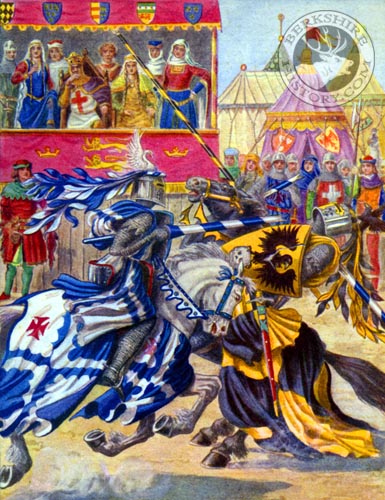 |
 |
|||
|
 Reading Abbey: Reading Abbey:Events under Edward III Tournaments & Weddings King Edward III was a renowned warlike monarch whose gallant archers and men-at-arms, many of whom were Berkshire men, won the great victories of Crecy and Poitiers. He was fond of the pageants of chivalry and, above all, of tournaments, or jousts. A tournament was a combat between two knights, or parties of knights, in armour. They fought, sometimes on horseback and sometimes on foot. The fighting took place in what were called lists. A large space was marked out, on a level meadow, and tents and pavilions were erected around it for the spectators. The knights on horseback charged one another with levelled lances, riding at full speed, and meeting in the midst of the lists with a shock. Courtiers and ladies were among the spectators, and the knights were eager to win their applause. The King watched the tournament from a high seat or throne and, when he pleased, he could stop the fight by throwing down his staff. These tournaments were very dangerous, and men were often killed in them. In such chivalrous sports, Edward passed his time at Reading in 1346, presumably in the Forbury, while staying at the Abbey. Before he went away, he borrowed some money from the Abbey in order to carry on the War with France. It was spent on great preparations at Windsor Castle. Immediately afterwards, he crossed over to France and won the great Battle of Crecy. Four years previously, King Edward had come to Reading Abbey to attend the wedding of his three-year-old son, Prince Lionel, to the Countess of Ulster. Some years later, in May 1359, he again came to Reading in order to be present at the marriage of his daughter, Princess Margaret, to the Earl of Pembroke and then, six days later, of his son,
John of Gaunt, to Blanche of Lancaster. Both marriages took place in the Abbey Church. Again there was a splendid pageant and more tournaments. The King, and his four sons, and nineteen knights entered the lists and that the tournaments lasted for two weeks.
|
|||
| © Nash Ford Publishing 2017. All Rights Reserved. | ||||





